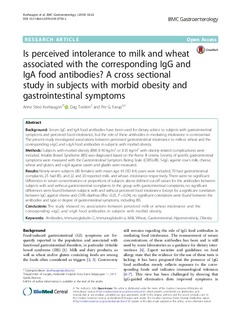| dc.contributor.author | Kvehaugen, Anne Stine | |
| dc.contributor.author | Tveiten, Dag | |
| dc.contributor.author | Farup, Per Grønaas | |
| dc.date.accessioned | 2019-02-13T15:45:40Z | |
| dc.date.available | 2019-02-13T15:45:40Z | |
| dc.date.created | 2018-07-04T13:23:15Z | |
| dc.date.issued | 2018 | |
| dc.identifier.citation | BMC Gastroenterology. 2018, 18:22 1-8. | nb_NO |
| dc.identifier.issn | 1471-230X | |
| dc.identifier.uri | http://hdl.handle.net/11250/2585325 | |
| dc.description.abstract | Background
Serum IgG and IgA food antibodies have been used for dietary advice to subjects with gastrointestinal symptoms and perceived food intolerance, but the role of these antibodies in mediating intolerance is controversial. The present study investigated associations between perceived gastrointestinal intolerance to milk-or wheat and the corresponding s-IgG and s-IgA food antibodies in subjects with morbid obesity.
Methods
Subjects with morbid obesity (BMI ≥ 40 kg/m2 or ≥35 kg/m2 with obesity-related complications) were included. Irritable Bowel Syndrome (IBS) was diagnosed based on the Rome III criteria. Severity of specific gastrointestinal symptoms were measured with the Gastrointestinal Symptom Rating Scale (GSRS)-IBS. S-IgG against cow’s milk, cheese, wheat and gluten, and s-IgA against casein and gliadin were measured.
Results
Ninety-seven subjects (80 females) with mean age 45 (SD 8.4) years were included, 70 had gastrointestinal complaints, 25 had IBS, and 22 and 20 reported milk- and wheat- intolerance respectively. There were no significant differences in serum concentrations or proportions of subjects above defined cut-off values for the antibodies between subjects with and without gastrointestinal complaints. In the group with gastrointestinal complaints, no significant differences were found between subjects with and without perceived food intolerance. Except for a significant correlation between IgG against cheese and GSRS-diarrhea (Rho: -0.25, P = 0.04), no significant correlations were found between the antibodies and type or degree of gastrointestinal symptoms, including IBS.
Conclusions
The study showed no associations between perceived milk or wheat intolerance and the corresponding s-IgG and s-IgA food antibodies in subjects with morbid obesity. | nb_NO |
| dc.language.iso | eng | nb_NO |
| dc.publisher | BMC | nb_NO |
| dc.relation.uri | https://bmcgastroenterol.biomedcentral.com/track/pdf/10.1186/s12876-018-0750-x | |
| dc.rights | Navngivelse 4.0 Internasjonal | * |
| dc.rights.uri | http://creativecommons.org/licenses/by/4.0/deed.no | * |
| dc.title | Is perceived intolerance to milk and wheat associated with the corresponding IgG and IgA food antibodies? A cross sectional study in subjects with morbid obesity and gastrointestinal symptoms | nb_NO |
| dc.type | Journal article | nb_NO |
| dc.type | Peer reviewed | nb_NO |
| dc.description.version | publishedVersion | nb_NO |
| dc.source.pagenumber | 1-8 | nb_NO |
| dc.source.volume | 18:22 | nb_NO |
| dc.source.journal | BMC Gastroenterology | nb_NO |
| dc.identifier.doi | 10.1186/s12876-018-0750-x | |
| dc.identifier.cristin | 1595641 | |
| dc.description.localcode | © The Author(s). 2018 Open Access This article is distributed under the terms of the Creative Commons Attribution 4.0 International License ( http://creativecommons.org/licenses/by/4.0/ ), which permits unrestricted use, distribution, and reproduction in any medium, provided you give appropriate credit to the original author(s) and the source, provide a link to the Creative Commons license, and indicate if changes were made. The Creative Commons Public Domain Dedication waiver ( http://creativecommons.org/publicdomain/zero/1.0/ ) applies to the data made available in this article, unless otherwise stated. | nb_NO |
| cristin.unitcode | 194,65,15,0 | |
| cristin.unitname | Institutt for klinisk og molekylær medisin | |
| cristin.ispublished | true | |
| cristin.fulltext | original | |
| cristin.qualitycode | 1 | |

